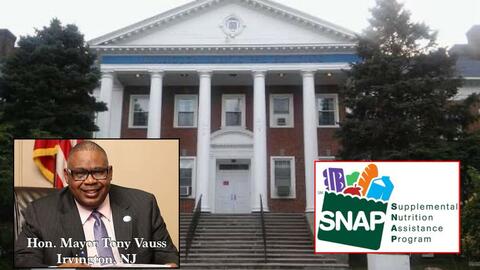By: Staff
In response to ongoing federal government uncertainty regarding SNAP benefit distribution, Mayor Tony Vauss announced a comprehensive community mobilization initiative designed to transform potential crisis into opportunity for civic engagement, mutual aid, and demonstrated commitment to collective responsibility for vulnerable neighbors.  The mayor's announcement reflects recognition that sustainable crisis response requires coordination across municipal government, nonprofit organizations, faith communities, local business, and engaged residents.
The mayor's announcement reflects recognition that sustainable crisis response requires coordination across municipal government, nonprofit organizations, faith communities, local business, and engaged residents.
"Food insecurity is not simply a federal policy failure—it is a failure of collective responsibility," declared Mayor Vauss.
"When government abandons vulnerable families, communities must step forward. I am calling on every Irvington resident with capacity to contribute—whether through volunteer service, financial donation, or community leadership—to recognize that protecting our neighbors' access to food is our shared obligation."
The mayor announced formation of the Irvington Community Food Response Coalition, bringing together food banks, faith-based organizations, community nonprofits, municipal government, local business, educational institutions, and resident volunteers into coordinated emergency response network.
The coalition represents innovative approach to crisis response, recognizing that sustainable solutions require bridging traditional silos between sectors and mobilizing the full community's capacity for mutual aid.
Coalition participants include the INIC, Irvington School, local business community (coordinating product donations and volunteer mobilization), and dozens of resident volunteers and neighborhood leaders.
"This coalition represents the best of Irvington—people from different backgrounds, institutions, and sectors coming together with shared commitment to ensure that no neighbor goes hungry," Mayor Vauss stated.
"We are not waiting for federal clarity. We are acting now, together, with the resources and compassion that define this community."
The mayor emphasized that civic participation in emergency response serves multiple crucial functions beyond immediate crisis mitigation.
Community mobilization strengthens social cohesion, builds networks of mutual aid that persist beyond immediate crisis, develops volunteer capacity for future emergencies, and demonstrates that communities can collectively care for vulnerable members even when institutional failures occur.
COMMUNITY PARTICIPATION OPPORTUNITIES:
Mayor Vauss specifically called on Irvington residents to engage in multiple forms of participation, recognizing that different residents have different capacity and resources:
- Financial Contribution: Donations to food banks and community organizations provide flexible resources for emergency response
- Volunteer Service: Residents can contribute 2-hour for food distribution, meal preparation, administrative support, or community outreach
- Product Donation: Individuals and businesses can contribute non-perishable food items, toiletries, and household supplies
- Neighborhood Leadership: Block captains and neighborhood leaders can coordinate outreach to identify vulnerable residents and connect them with available resources
- Professional Expertise: Healthcare providers, social workers, educators, and other professionals can contribute specialized skills to support vulnerable populations
- Transportation: Individuals with vehicles can assist seniors and individuals with disabilities in accessing food distribution sites
The mayor specifically addressed seniors, individuals with disabilities, and working families who may face barriers to accessing traditional food assistance, emphasizing that municipal resources and volunteer networks exist specifically to remove access barriers.
"If you are struggling to access food, our community has resources available," Mayor Vauss stated. "If you cannot navigate SNAP applications, volunteers are available to help.
If you cannot travel to food distribution sites, transportation is available.
If you are isolated or in crisis, community partners are trained to support you. Irvington will ensure that no resident faces barriers to accessing food and support."
The mayor also noted that community mobilization during crisis serves educational function, helping residents understand both the prevalence of food insecurity and the governmental policies that create it.
Education and awareness-building complement emergency response, positioning communities for longer-term advocacy for federal policy reform.
"Many residents may not understand how many of their neighbors struggle with food insecurity," Mayor Vauss explained.
"By working together in community response, we develop understanding that motivates sustained advocacy for federal policy protecting vulnerable populations. We transform crisis into opportunity for awareness and commitment to change."
The mayor also emphasized that Irvington's response reflects broader national recognition that municipalities must develop emergency governance capacity when federal systems fail.
Cities and states nationwide are mobilizing resources, with recognition that local government proximity to vulnerable populations positions municipalities as the most effective crisis response coordinators.
"Irvington is joining cities and states nationwide in demonstrating that local governance matters," Mayor Vauss stated.
"When federal policy fails, municipalities must protect vulnerable populations. This moment represents opportunity for America to recognize that we are stronger when we acknowledge our interdependence and commit collectively to protecting each other."
Residents interested in volunteering, donating, or accessing resources can contact:
Irvington Neighborhood Improvement Corp
Josie Monel, Director
346 16th Avenue, Irvington, NJ 07111
Main: 973-416-0916

